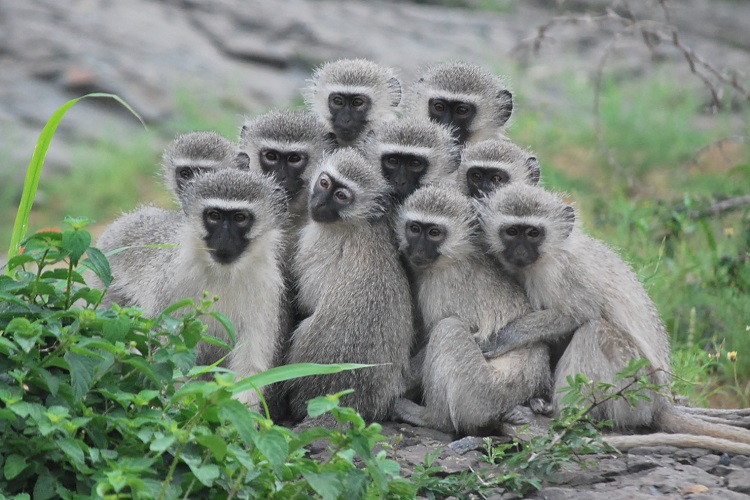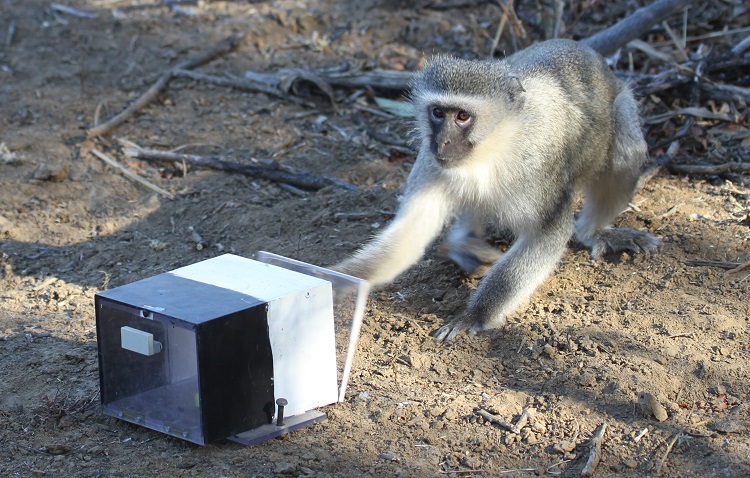Male monkeys take it where they can get it
 Female vervet monkeys will only take lessons from other females, while males are less discriminating in whom they learn from, new research by the University of St Andrews has found.
Female vervet monkeys will only take lessons from other females, while males are less discriminating in whom they learn from, new research by the University of St Andrews has found.
An international research team involving St Andrews and the Universities of Lausanne and Zurich, found more evidence of cultural traditions in vervet monkeys, echoing some of the ways humans pick up traditions from each other.
The new study, led by Axelle Bono and Professor Erica van de Waal of the University of Lausanne, was an international collaboration with Professor Andrew Whiten of the University of St Andrews and colleagues at the University of Zurich.
Professor Whiten, of the School of Psychology and Neuroscience at St Andrews, said: “The explanation for the sex difference may be that for females the important thing is to maintain close bonds with the other females they spend their whole lives with in the same group.
“They may be less inclined to copy males, who are likely to have less reliable local knowledge.”
The new paper, published in Current Biology (30 August), explores whether the monkeys learn by copying the most successful foragers.
A previous study by Professor van de Waal had presented the monkeys with a novel challenge, opening an ‘artificial fruit’ that could be dealt with in either of two ways.
After training one monkey in each of several groups to use just one of these methods, it was found that others in the group tended to pick up the local method introduced, but only when the first knowledgeable monkey was a female.
The scientists suggested this is because maturing males disperse to other groups living in different places, whereas females stay in their birth group all their lives. This means it is the females who are the likely reservoirs of the best local cultural knowledge on what to forage on, where to find it, and how to extract the edible parts from it.

The new study created a new ‘artificial fruit’ box that could be opened at either its black end or its white end, to extract a piece of apple (pictured above).
If the dominant female approached, the researchers could use a remote control to ensure that she learned she could get the apple only from one coloured end (black in some groups, white in others).
In the same way, the highest ranking males were trained to use the other end. However, the researchers arranged it so these males now got five times more food than did the females.
The researchers wanted to know whether the others in the group would follow their habitual preference to copy the females, or would they now be more flexible, and be swayed by the greater success of the males?
The team found that males showed a significant tendency to copy the successful males rather than the usual preference to copy females; but females in the group stuck to copying the female demonstrator, despite her relatively lower success.
Axelle Bono, of the University of Lausanne, said: “For males, things are different. To integrate into a new group, being able to behave flexibly may be adaptive, enabling males to adopt the most efficient strategy to learn from others depending on the situation they find themselves in.”
The paper, Payoff and sex-biased social learning interact in a wild primate population, by A E J Bono, A Whiten, C van Schaik, M Krutzen, F Eichenberger, S Schnider and E van de Waal, is published in Current Biology.
Please ensure that the paper’s DOI (doi.org/10.1016/j.cub.2018.06.015) is included in all online stories and social media posts and that Current Biology is credited as the source.
Images © Erica van de Waal
Issued by the University of St Andrews Communications Office.